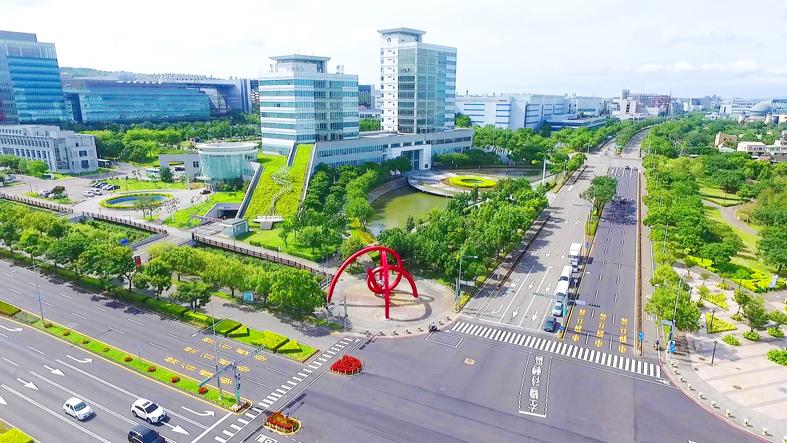Sales generated by the Central Taiwan Science Park (CTSP, 中部科學園區) in the first 10 months of the year hit a record NT$843.05 billion (US$30.28 billion), up 9.45 percent from NT$770.25 billion over the same period last year, the CTSP Bureau said.
The science park is home to many tech heavyweights from a wide range of sectors, including semiconductors, precision machinery, biotech, optoelectronics and renewable energy.
The park’s semiconductor firms posted NT$649.71 billion in combined sales over the 10-month period, up 4.68 percent from a year earlier and accounting for 77.07 percent of the park’s total sales, the bureau said last week.

Photo courtesy of the Central Taiwan Science Park Bureau via CNA
Taiwan Semiconductor Manufacturing Co (台積電), the world’s largest contract chipmaker, operates a 12-inch wafer fab in the science park, producing chips made using the company’s advanced process technology.
The semiconductor industry has benefited from growing demand for emerging technologies, such as applications for 5G and artificial intelligence, high-performance computing devices and automotive electronics, the bureau said.
Optoelectronics firms posted NT$155.35 billion in combined sales, soaring 30.37 percent from a year earlier and making up 18.43 percent of its total sales, the bureau said.
The companies benefited from a booming stay-at-home economy that has led to increased demand for devices used in remote working and distance learning, the bureau said, adding that the commercial use of mini-LED technologies helped boost sales in the optoelectronics sector.
Precision machinery makers posted NT$24.64 billion in combined sales, up 23.95 percent from a year earlier and accounting for 2.92 percent of the park’s sales.
Biotech firms posted NT$6.36 billion in sales, up 16.94 percent from a year earlier, while computer and peripheral producers generated NT$3.97 billion in sales, up 51.66 percent year-on-year.

South Korea’s equity benchmark yesterday crossed a new milestone just a month after surpassing the once-unthinkable 5,000 mark as surging global memory demand powers the country’s biggest chipmakers. The KOSPI advanced as much as 2.6 percent to a record 6,123, with Samsung Electronics Co and SK Hynix Inc each gaining more than 2 percent. With the benchmark now up 45 percent this year, South Korea’s stock market capitalization has also moved past France’s, following last month’s overtaking of Germany’s. Long overlooked by foreign funds, despite being undervalued, South Korean stocks have now emerged as clear winners in the global market. The so-called “artificial intelligence

NEW IDENTITY: Known for its software, India has expanded into hardware, with its semiconductor industry growing from US$38bn in 2023 to US$45bn to US$50bn India on Saturday inaugurated its first semiconductor assembly and test facility, a milestone in the government’s push to reduce dependence on foreign chipmakers and stake a claim in a sector dominated by China. Indian Prime Minister Narendra Modi opened US firm Micron Technology Inc’s semiconductor assembly, test and packaging unit in his home state of Gujarat, hailing the “dawn of a new era” for India’s technology ambitions. “When young Indians look back in the future, they will see this decade as the turning point in our tech future,” Modi told the event, which was broadcast on his YouTube channel. The plant would convert

‘SEISMIC SHIFT’: The researcher forecast there would be about 1.1 billion mobile shipments this year, down from 1.26 billion the prior year and erasing years of gains The global smartphone market is expected to contract 12.9 percent this year due to the unprecedented memorychip shortage, marking “a crisis like no other,” researcher International Data Corp (IDC) said. The new forecast, a dramatic revision down from earlier estimates, gives the latest accounting of the ongoing memory crunch that is affecting every corner of the electronics industry. The demand for advanced memory to power artificial intelligence (AI) tasks has drained global supply until well into next year and jeopardizes the business model of many smartphone makers. IDC forecast about 1.1 billion mobile shipments this year, down from 1.26 billion the prior

People stand in a Pokemon store in Tokyo on Thursday. One of the world highest-grossing franchises is celebrated its 30th anniversary yesterday.